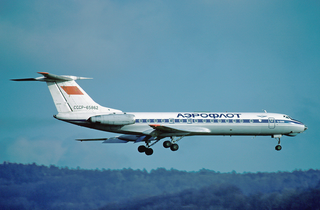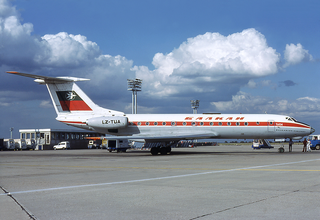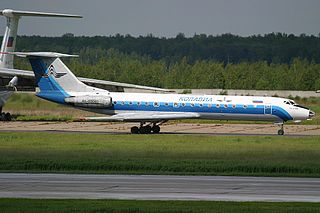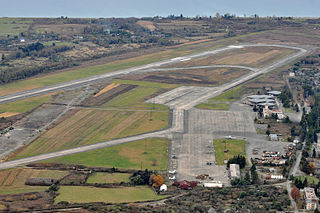 W
WThe 1985 Zolochiv mid-air collision occurred when Aeroflot Flight 8381, a scheduled flight of a twin-engine Tupolev Tu-134 that departed Tallinn Airport in Estonian SSR, Soviet Union, at 10:38 am on 3 May 1985, for Chişinău in Moldavian SSR, Soviet Union making a stopover at Lviv, Ukrainian SSR, Soviet Union. While descending to Lviv in overcast weather, it collided at 12:13 with Soviet Air Force Flight 101 that had just taken off from Lviv. The collision occurred at an altitude of 13,000 feet (4,000 m). Both aircraft lost their right wings and tails, went out of control and crashed about one or two minutes later near the village of Zolochiv, Ukrainian SSR, Soviet Union, killing all 94 people on both aircraft.
 W
WAeroflot Flight 892 was a scheduled international passenger flight from Minsk to East Berlin, which crashed on 12 December 1986 due to pilot error, killing seventy-two of the eighty-two passengers and crew on board.
 W
WAeroflot Flight 2306 was a scheduled domestic passenger flight from Vorkuta to Moscow in the Soviet Union, with a stopover in Syktyvkar. The Tupolev Tu-134 operated by Aeroflot crashed on 2 July 1986 during an emergency landing after it departed Syktyvkar, killing 54 of 92 passengers and crew on board.
 W
WAeroflot Flight 2808 was a scheduled domestic passenger flight from Mineralnye Vody to Ivanovo, both in Russia, with a stopover in Donetsk, Ukraine on 27 August 1992. While attempting to land at Ivanovo airport, the Tupolev Tu-134 crashed into a group of buildings in the village of Lebyazhy Lug. Investigators determined the cause of the accident was errors made by the crew and the air traffic controller. There were no fatalities on the ground, but all 84 people on board the flight died in the crash.
 W
WAeroflot Flight 5463 was a Soviet domestic passenger flight from Chelyabinsk to Almaty which crashed on 30 August 1983 while approaching Almaty. The Tupolev Tu-134A collided with the western slope of Dolan Mountain at an altitude of 690 m (2,260 ft). As a result of the accident, all ninety people on board were killed. Crew error was cited as the cause of the accident.
 W
WAeroflot Flight 6502 was a Soviet domestic passenger flight operated by a Tupolev Tu-134A from Sverdlovsk to Grozny, which crashed on 20 October 1986. 70 of the 94 passengers and crew on board were killed. Investigators determined the cause of the accident to be pilot negligence.
 W
WAeroflot Flight 6833, en route from Tbilisi, Georgian SSR, to Leningrad, Russian SFSR, with an intermediate stop in Batumi, was the scene of an attempted aircraft hijacking by seven young Georgians on 18–19 November 1983. The crisis ended with a storming of the Tu-134A airliner by Alpha Group that resulted in eight dead. The surviving hijackers were subsequently tried and executed.
 W
WAeroflot Flight 7841 was a scheduled Soviet domestic passenger flight from Minsk to Leningrad, which crashed on 1 February 1985 killing fifty eight people on board. Twenty-two people survived the accident. The crash was caused by engine failure brought on by ice ingestion. On 8 May 1985 the Tupolev Tu-134A was officially written off.
 W
WOn 10 July 1977, two Soviet hijackers took over an Aeroflot Tupolev Tu-134 flight in the hope of diverting it to Stockholm, Sweden. Lacking the fuel to do this, the aircraft landed at Helsinki Airport, Finland, where the hijackers kept hostages to demand that the Finnish authorities refuel the aircraft and provide it with a new crew. The hijackers fell asleep, however, and the hostages escaped. Without this bargaining power, the hijackers surrendered and were extradited back to the Soviet Union, where they were sentenced to lengthy prison terms.
 W
WAviogenex Flight 130 was an international charter passenger flight from Gatwick Airport, London, to Rijeka Airport, Yugoslavia. On 23 May 1971, the Tupolev Tu-134A servicing the flight suffered structural failure during landing. The aircraft flipped over and caught fire, killing 78 people. The crash became the first accident of the Tupolev Tu-134 since entering service.
 W
WAzerbaijan Airlines Flight 56 was a scheduled domestic passenger flight from Nakhchivan to Baku operated by Azerbaijan Airlines which crashed on 5 December 1995, killing 52 people. The aircraft servicing the flight, a Tupolev Tu-134B-3, experienced engine failure while climbing. The pilots performed a forced landing that required a sharp right turn to avoid an apartment block. The aircraft crashed in the south-western outskirts of Nakhchivan, 3,850 m (2.39 mi) from the airport runway.
 W
WThe 1978 Balkan Bulgarian Tupolev Tu-134 crash was an accident that occurred on 16 March 1978, when a Balkan Bulgarian Airlines Tupolev Tu-134 airliner on an international flight from Sofia Airport to Warsaw Airport crashed. All passengers and crew died in the crash. As of 2021, it remains the worst accident in Bulgarian aviation history. Exact cause of the crash remains unknown.
 W
WThe 1984 Balkan Bulgarian Tupolev Tu-134 crash occurred on 10 January 1984 when a Balkan Bulgarian Airlines Tupolev Tu-134 airliner crashed on an international flight from Berlin Schönefeld Airport in Schönefeld, East Germany, to Sofia Airport in Sofia, Bulgaria. All fifty on board were killed.
 W
WOn 11 August 1979, a mid-air collision occurred over the Ukrainian SSR, near the city of Dniprodzerzhynsk. The aircraft involved were both Tupolev Tu-134As on scheduled domestic passenger flights, operated by Aeroflot.
 W
WInterflug Flight 1107 was a flight operated by East German airline Interflug from Stuttgart in West Germany to Leipzig in East Germany. On 1 September 1975 a Tupolev Tu-134 operating on the route crashed during its approach to Leipzig, killing 27 of the 34 passengers and crew on board.
 W
WLOT Polish Airlines Flight 165 hijacking was the hijacking of a LOT Polish Airlines that occurred on 30 August 1978. The hijackers from East Germany (GDR) were seeking political asylum in West Germany (FRG). The plane landed safely, and the primary hijacker was tried and convicted by a West German jury in the specially convened United States Court for Berlin and sentenced to time served, the nine months he had already served during pretrial detention.
 W
WAt about 11:45 A.M. on September 16, 1971, Malév Flight 110 crashed near Kiev-Borispol Airport. It was making its approach, but there was poor visibility; due to heavy fog and poor weather conditions, it was limited to 1800 meters. To worsen the situation, the plane's generator had failed, forcing the crew to switch to the battery's auxiliary power. But due to the poor visibility, the crew was forced to make two landing attempts, both of which failed. As they tried to land, the visibility significantly decreased to about 700 meters. Usually, in the event of emergency, the equipment necessary to control the airplane could operate using batteries for at least sixty minutes when staff shut down excessive consumers such as refrigerators, kitchen heaters, or cabin lighting in time. This did not happen, so battery life decreased by half. The plane eventually ran out of battery power and crashed several kilometers away from the airport. The plane broke up and all 49 people on board perished. After an investigation, officials determined that the crash was caused by an unfortunate series of events involving pilot error, mismanagement of the situation by the ground crew, aircraft malfunctions, and poor conditions.
 W
WOn 19 October 1986, a Tupolev Tu-134 jetliner belonging to the Mozambican People's Republic carrying President Samora Machel and 43 others from Mbala, Zambia to the Mozambican capital Maputo crashed at Mbuzini, South Africa. Nine passengers and one crew member survived the crash, but President Machel and 33 others died, including ministers and officials of the Mozambican government.
 W
WRusAir Flight 9605 was a passenger flight which crashed near Petrozavodsk in the Republic of Karelia, Russia, on 20 June 2011 while attempting to land in thick fog. The aircraft involved, a Tupolev Tu-134, was operating a RusAir scheduled domestic flight from Moscow. Of the 52 people on board, only 5 survived.
 W
WOn the night of 24 August 2004, explosive devices were detonated on board two domestic passenger flights that had taken off from Domodedovo International Airport in Moscow, Russia, causing the destruction of both aircraft and the loss of all 90 people on board them.
 W
WFrom 20 to 23 September 1993 during the Sukhumi massacre as part of the war in Abkhazia, separatists in Sukhumi, Abkhazia blocked the Georgian troop's overland supply routes.
 W
WUTair Flight 471 was a scheduled domestic passenger flight of a Tupolev Tu-134 on March 17, 2007, that suffered heavy structural damage during a hard landing at Samara Kurumoch Airport near Samara, Russia. Of the 50 passengers and 7 crew members on board, 6 people were killed and 20 injured when the aircraft broke apart. The plane was flying from the Siberian city of Surgut to Samara and then to Belgorod.
 W
WVietnam Airlines Flight 815 was a scheduled Vietnam Airlines flight from Ho Chi Minh City to Phnom Penh's Pochentong International Airport. The Tupolev Tu-134B-3 aircraft crashed on final approach approximately 800 metres short of the runway, killing 64 of the 66 people on board. The aircraft was completely destroyed.
 W
WVietnam Airlines Flight 831, a Tupolev Tu-134, crashed in a rice field near Semafahkarm Village, Tambon Khu Khot, Amphoe Lam Luk Ka, Pathum Thani, Thailand while operating a flight from Hanoi to Bangkok in 1988. The cause of the accident is undetermined, however the pilots reported the aircraft may have been struck by lightning. Three crew and 73 passengers died in the accident. This accident was the second deadliest accident at the time in Thailand, and is currently the fifth deadliest.